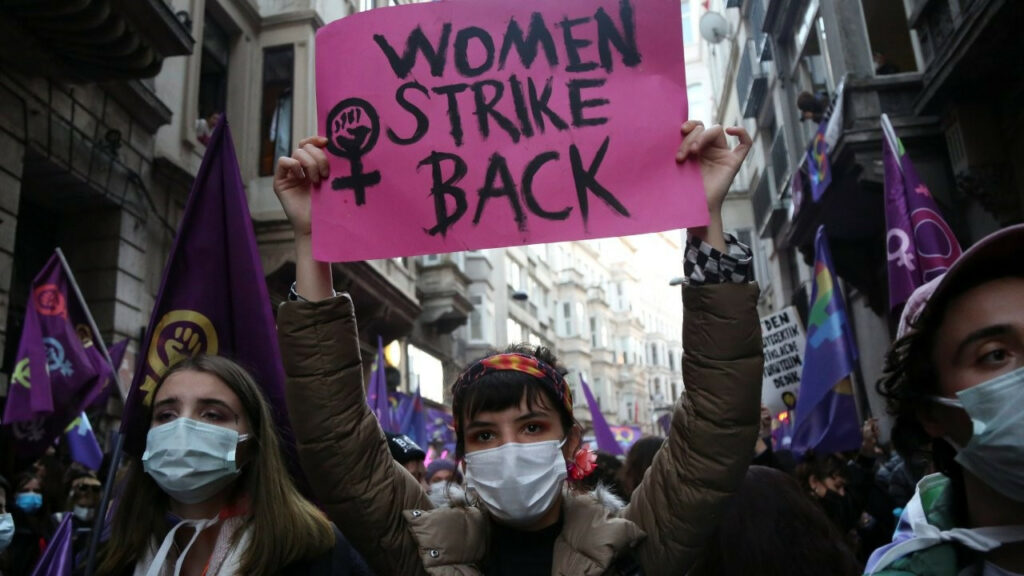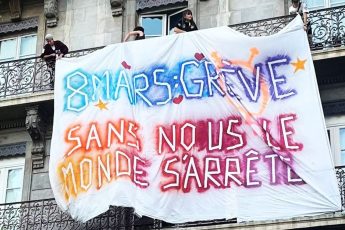
By E.A.S.T. (Essential Autonomous Struggles Transnational)
A war is being waged in Europe, and it’s patriarchal in character. With different intensities, conservative policies all over Europe violently hit the freedoms of women and LGBTQI people, at the same time as weaponizing them in nationalist discourse. While the family appears as the only destiny women should aspire to, the worsening of material living and working conditions chokes the possibility of struggle that we have long fought for.
Yet, we – the feminist movement and anti-patriarchal forces – are not silent. On the 8th of March millions of women and LGBTQI people took to the streets once again to fight back against this patriarchal attack, made in the context of and fueled by a broader war. For more than a year the war in Ukraine has provided a premise for nation-states to re-order and, in many cases, reverse social organisation at the expense of women, LGBTQI people, migrants, workers. In response, the feminist tide, exceeding any expectation that it might be receding, rose once again to express its insubordination against the harshening of patriarchal violence, the rise of “family-based” policies that obstruct access to abortion and sexual freedom, and the strengthening of racist policies that make migrant women’s lives even more exploitable.
This insubordination does not stop with the 8th March. It continues to flow and fuel multiple struggles. We are seeing it in the strike waves in France and Britain, in the mobilisations taking place in Italy for the 6th of May that demand free and safe abortion and in the counter-demonstration against the “March for Life” in Prague. For the 1st of May, International Labor Day, we will continue to fuel this insubordination by igniting different mobilizations that will take place in Europe and around the world to counter the patriarchal attack that this war is exacerbating at different latitudes.
Between authoritarian and democratic patriarchy
While the European commission has condemned the Hungarian anti-LGBTQI law that equates homosexuals with paedophiles, it does not have much leverage to impose anything on Orban. For the EU, his ambivalent attitude toward Putin is still preferable to an open hostility to the EU and NATO. That an EU procedure against Poland, which faced scrutiny for its anti-LGBTQI policies, was dropped comes as little surprise considering that, just like its Visegrad partner Orban, Prime Minister Morawiecki is a valuable ally in the war in Ukraine – a watchdog of the Belarusian border and the first country for Ukrainian refugees’ arrivals. The EU is now paying Poland its European Recovery Plan money, disregarding its government’s homophobic attitude, the country’s anti-democratic constitution and the price women are paying thanks to the virtually absolute ban on abortion. And while the EU parliament has voted against the Italian government’s anti-LGBTQI stance, here too, its words sound no less empty and rhetorical. We should not expect any remedy against possible infringements of its supposedly democratic values to come from the EU itself. Therefore, while the “fortress of democracy” is busy in fighting the authoritarian threat on the Eastern border, its member states – such as Poland, Hungary or Italy – bind together over patriarchal and racist policies they are free to enact, provided they remain stable supporters of this war.
Behind its gender equality and LGTBQ-friendly discourses, then, the EU tolerates anti-women and anti-LGBTQI policies from its member states because this is the price to keep the EU united, now that the costs of the war in Ukraine are rising and millions of people are increasingly in opposition to their governments’ choices to prolong the war at their expense. Strikes and protests – against pensions’ reform in France, for higher wages in the transport sector in Germany, for overdue salaries of posted truck drivers, for better working and wage conditions for nurses and other public sectors in the UK, to name just a few examples – are spreading in Europe and beyond.
We can see the current patriarchal attack being waged against women and LGBTQI people in Europe as a response, in part, to this expanding rage. This attack has reconfigured itself in the context of the war in Ukraine but is still premised on the alliance between anti-abortion and anti-LGBTQI measures and is intertwined with and exacerbated by institutional racism and neoliberal reforms. At the core of this attack is the idea of the family. As a fundamental pillar of social order, the institution of the family is materially tied to income and allowances, benefits, productivity and welfare and is thus rendered inescapable and indispensable. The family acts as the cell for the reproduction of precarity, because to mother under current capitalist conditions is to accept to produce a precarious and disposable workforce. It is an imposition on women, people of oppressed genders and migrants in particular; to extract their (usually free) reproductive labour. This is not to say we do not value motherhood, mothering or mothers, but that the capitalist system does not. Nor do we accept the notion pushed by the conservative and fascist right that to be valued as women we must become one.
Fighting against racist and patriarchal violence from East to West
In Italy anti LGBTQI measures – denying the registry office certificate to same sex couple’s children – add to pro-family measures. A recent proposal wants to cut taxes for families with two or more children, regardless of their income, just like Orban did in Hungary – incentivizing childbirth for women under 30 or with 4 children by slashing their income taxes. These patriarchal policies are closely interlinked with racist declarations; while the Italian minister of agriculture said that we must prevent ‘ethnic replacement’ by having more children, the Prime Minister said that women should finally enter the labour market and take up the jobs now performed by migrants. The new immigration law makes the status of thousands of migrants illegal, obstructs family reunification and ties even more migrants’ possibility for staying in Italy to their availability to exploitation. The message of social order is clear: do not believe you are free to move, to get away from or be united with your family, nor exercise your sexual and reproductive freedoms. Patriarchy always fuels nationalism and racism.
Patriarchal attack also cuts across the war fronts: in Russia the government has labelled feminism an extremist ideology, accusing protestors of being anti-war, anti-nationalist and anti-family. The state threatens to prosecute insubordinate women, while valorizing the heroine “mothers” of soldiers and crippling the freedom to access abortion. In the Czech Republic, a pro-life demonstration was unexpectedly given wide resonance in a country relatively free from religious interference, and renowned for providing help to women from Poland seeking abortion, whilst becoming increasingly hostile to Ukrainian refugees, accused of undermining national welfare. This is not simply an isolated incident in a non-Catholic country that has seemingly otherwise no visible anti-abortion agenda outside of the fanatical fringe: another pro-life march under the same name is expected to happen in the UK in September. Here, the fiercely anti-trans and increasingly pro-family conservative rhetoric paves the way and gives confidence to an increasingly organised and well-funded far-right to mainstream its agenda.
The reaffirmation of patriarchal messages reflects an attempt to reimpose a social order that imposes a coercion to work, respect for hierarchy – not only for women but for all – and goes hand in hand with the intensification of institutional racism both at the national and EU level – from the messages from Von Der Leyen against expected migrants’ waves from Africa, to the deals with African countries that give funds and investments in exchange of the containment of migrants movements towards Europe.
Yet, just as women and LGBTQI people are continuing to practice their freedoms, workers are continuing to strike and migrants are still crossing borders, feminist movements are not silently waiting to be pushed back.
Feminists strike back
The feminist strike on the 8th of March showed again the possibility to refuse the violence of this society, its hierarchies and exploitation as women took massively to the streets. After three years of alternate lockdowns, Covid containment policies, and the shock of the war in Ukraine, this year signalled the re-emergence of the strength of the global feminist movement. Albeit with uneven levels of organisation, everywhere the feminist strike reimposed itself as the response to the worsening patriarchal attacks, too often justified by the war: the extreme violence of the war and accompanying state repression, the imposition of patriotic duties on women – either as heroic mothers, soldiers on the front, uteruses of the society, refugees turned into cheap workforce – and the limitations on sexual freedoms for them and LGBTQI people. The feminist strike has amplified larger protests such as those in France against pensions’ reform and in Greece against the criminal dismantlement of public services. It has amplified the cry of the Kurdish women’s movement “Jin, Jiyan, Azadi!” as the anti-theocratic and anti-patriarchal mobilizations in Iran and Turkey continue. Here, finally, the elections in May present an opportunity to overthrow Erdogan’s authoritarian regime, responsible for the tragic mismanagement of the disastrous earthquake and signatory of many murderous agreements with the EU to hinder refugees from reaching Europe.
Moreover, the strike echoes beyond the 8th of March, resonating in our contexts and everyday practices and struggles. Last week in Prague women and LGBTQI collectives called a rally to protest against the pro-life demonstration, pushing back any religious and conservative agenda that would have a tremendous impact on their rights as well as expectations in social reproduction. On the 6th of May, the Italian feminist movement Non Una di Meno will be in Ancona for a national demonstration. At stake is the freedom of abortion, and the whole set of patriarchal and racist measures that the Italian government uses to sustain its neoliberal ambitions. In the last few weeks, Polish feminists organised the Women’s Social Congress, joined by hundreds of women and LGBTQI people from all over the country, while there have been mobilizations and strikes of workers in essential sectors. There is a new urgency, from East to West, to take back our feminist transnational organising, uniting the struggle in social reproduction of women, migrants, workers, LGBTQI people, and linking it with anti-war initiatives and climate activism.
For May 1st we say out loud that to fight against exploitation means to fight against patriarchal violence, anti-LGBTQI measures, and for sexual freedom, freedom of abortion and freedom of movement. We continue to cross the borders, we continue to smash patriarchal oppression, we continue to subvert the fronts of the war. Let’s organise our counterattack to the patriarchal war!
As E.A.S.T. we will gather again online for a meeting on the relationship between feminist and labour and union struggles, and physically during the next transnational meeting of the Transnational Social Strike in September. More info soon! To join the E.A.S.T. network, please send an email to essentialstruggles@gmail.com and/or join the facebook group: https://www.facebook.com/groups/343349476881958





